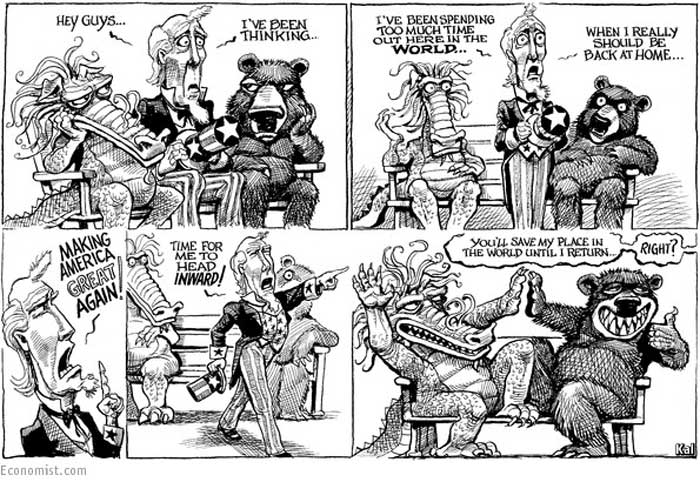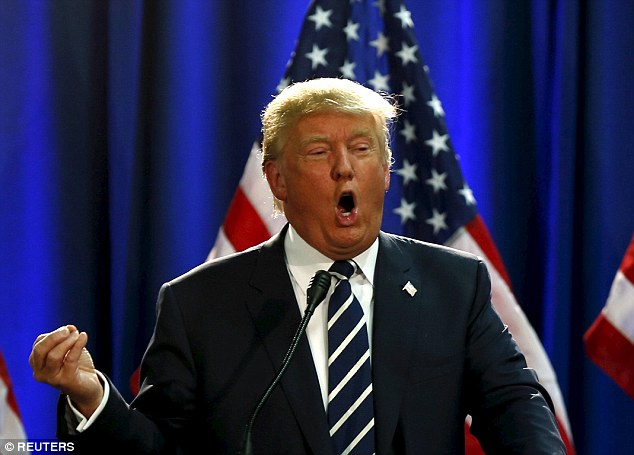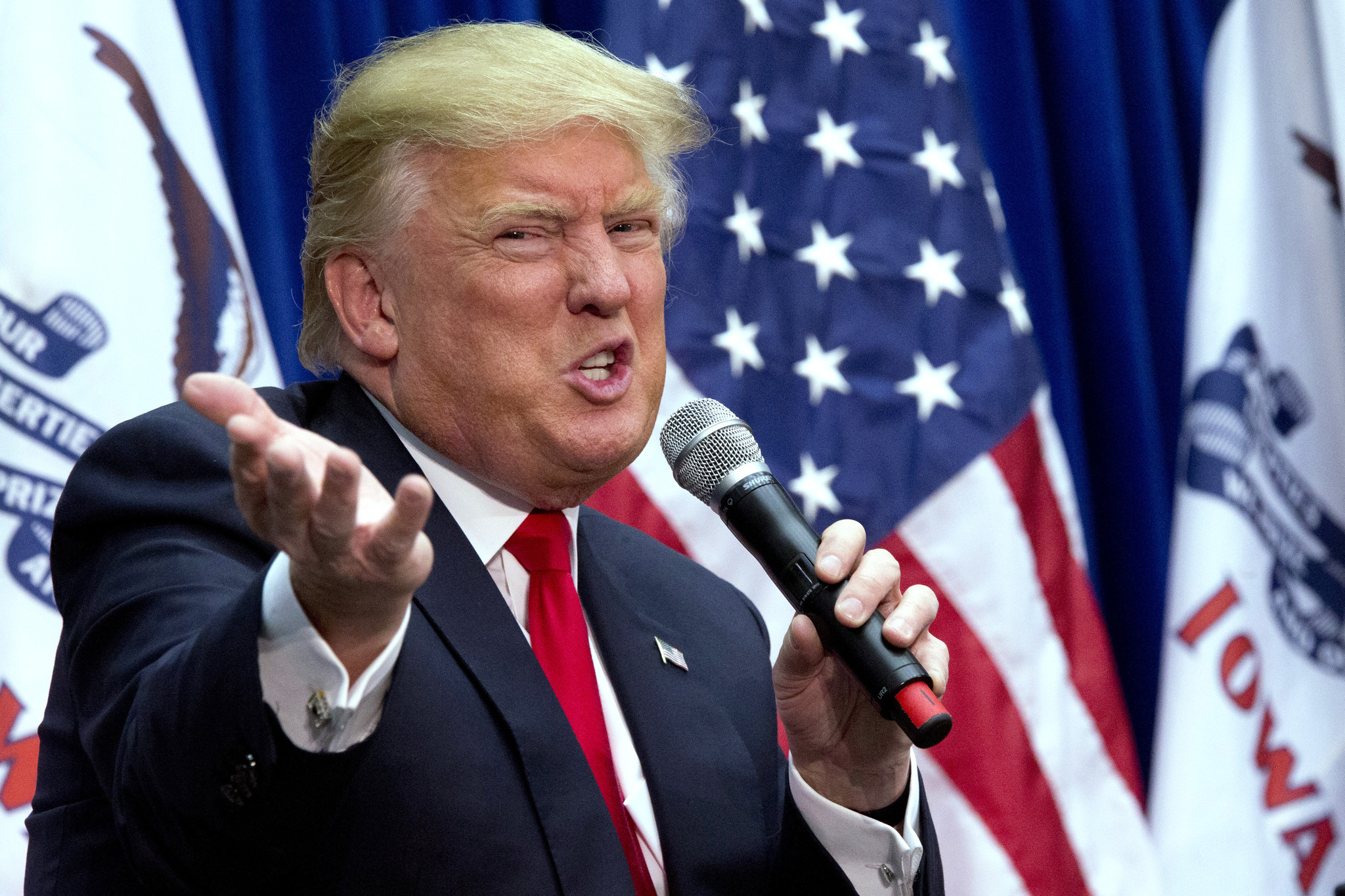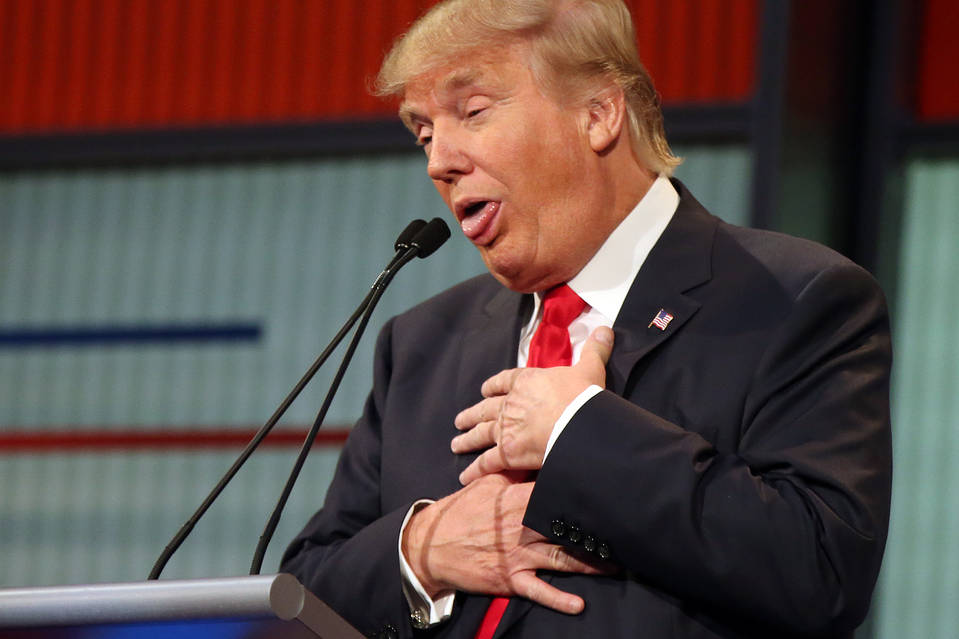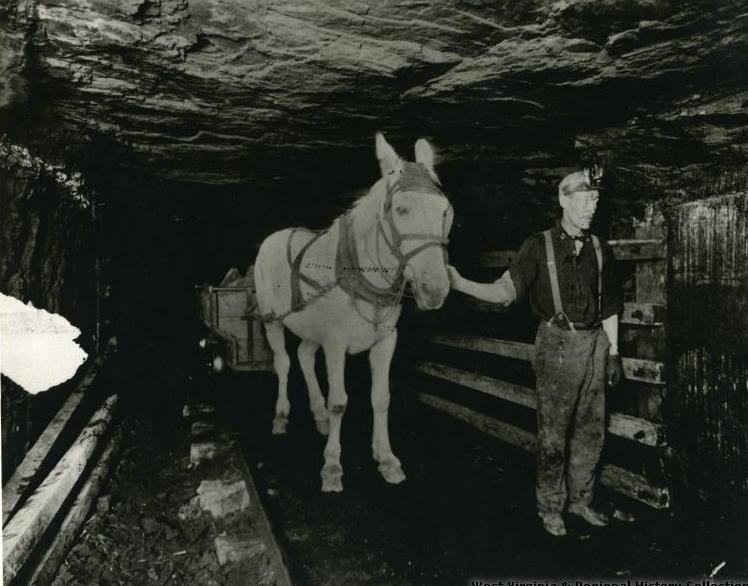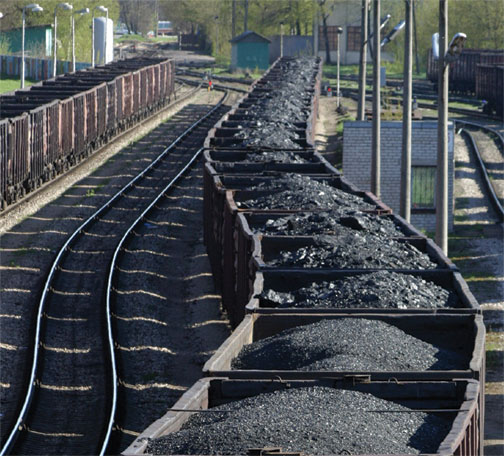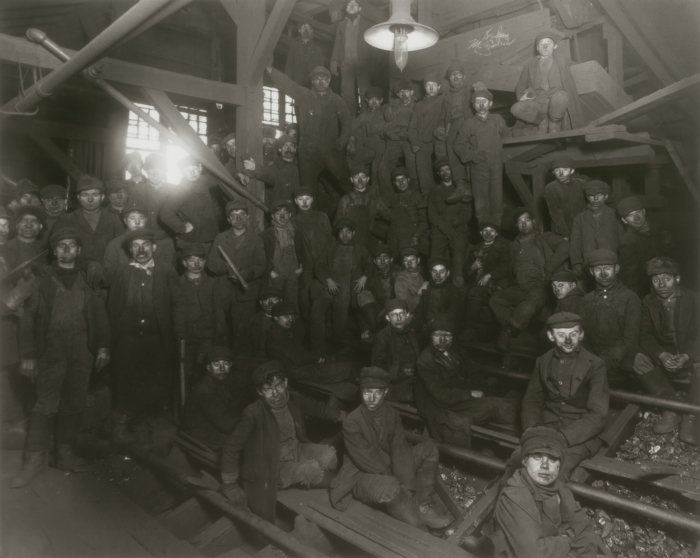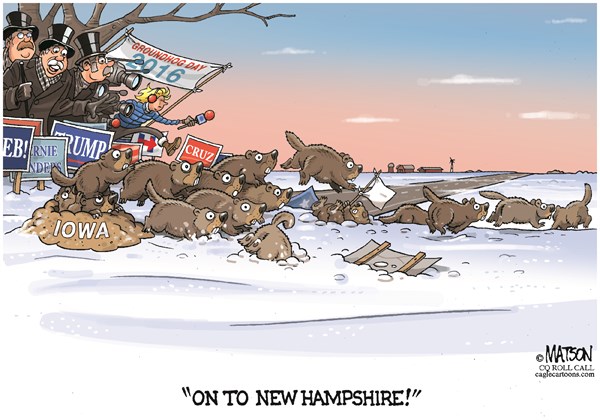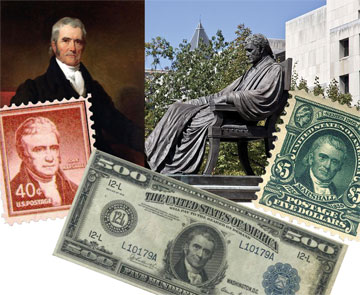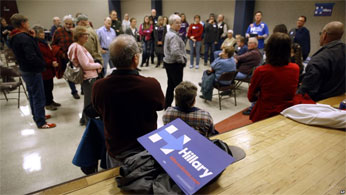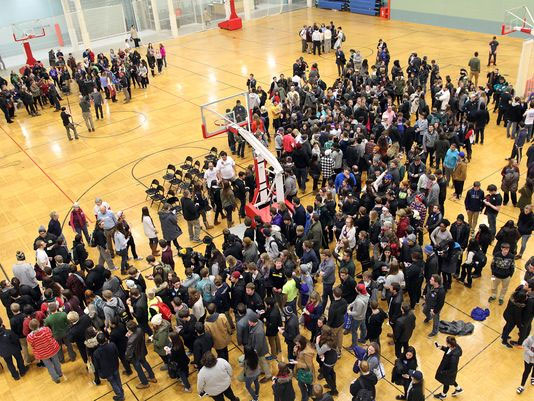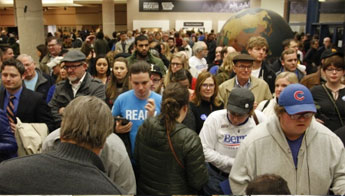|
The way things look ... |
 |
 |
 |
 |
 |
Gallup Wkly: 59% - 1/19/17)
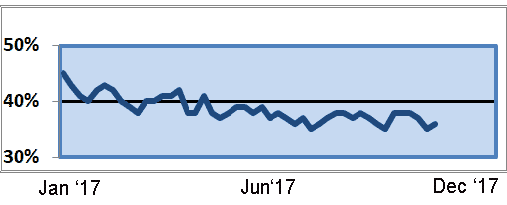
12/19/16 -- What just happened?
|
To many it was a horrible surprise. But in the end it came down to this: What could happen, did happen. Donald Trump will be administered the oath of office as the 45th President of the United States on Jan 20, 2017. Tune in. Democrats should stop rending their garments, and remember how dead the Republicans were in 2009. How they might never again win a national election. They did, and it was easier than anyone thought, and look who did it. They certainly didn't change all that much. There have been no systemic seismic shocks either. As the dust settles, the world is still the old world yet. She lost by just a few points in a few states. Not that some serious strategic fine tuning going forward would be a wild idea for Democrats to consider. By DailyKos's reckoning, Republicans won more political power overall in 2016 than in any election since 1928, with both houses of Congress (Senate: -2; House: -6) and the Supreme Court under their spell as well as 33 governorships (+2) and 68 state legislative chambers (+1). Democrats have a problem and it's not Hillary Clinton's intrinsically corrupt character. Considering the results of the last several elections, it's easy to make a case that Americans prefer Republican leaders to Democrats even though there appear to be more Democratic voters than Republican and even though Republican values and sentiments do not match up very well with the values and sentiments of the general public based on the findings of national pollsters like Gallup and Pew. Coaches in any sport will tell you that it's hard to beat the same opponent three times in a row. And it's true the White House tends to flip to the other party after two terms regardless of other conditions. But it's also true that's not what it looked like was going to happen this time. It was close. She won the popular ballot by almost 3,000,000 votes and lost the electoral vote 306 -232 (results pending). On average, polls tend to miss by 2% in a presidential election; they weren't that far off. And there were warning signs. The momentum was with Trump at the end and he ended up with his only lead of the campaign at the only point where it mattered. Was Trump beatable? Even he thought so. Turns out Clinton was too. But Pennsylvania? Michigan? Wisconsin? In hindsight, Clinton's campaign revealed itself flawed in three ways. One, she failed to shore up her "blue wall" in the rust belt (which shows signs lately of, er, turning red. Two, she failed in general to inspire the Obama coalition and get her vote out in battleground states. A solid ground game was going to be one of Clinton's strengths. Instead, it proved an area where she had fatal weaknesses. Hilariously, Trump didn't, even though he had essentially no "GOTV" organization at all. That bears pondering. Three, Trump turned out to have a better campaign message, preposterous as it was. Clinton's message was: He's no good, and that proved not good enough. PA was clearly the big surprise. Clinton campaigned hard there. She didn't visit WI even once during the campaign. (The state had voted for a polarizing Republican governor in the two previous general elections plus in a recall.) She was certainly visible in MI, but just as clearly her economic message didn't resonate there. At least not enough. Her campaign was being pressed by none other than her husband (the former two-term president) to pay more attention to those three states, but the campaign ignored him. Bill seemed to have the same relationship with Hillary this campaign as Homer Simpson does with beer. ("The cause and the solution to all life's problems.") But his political instincts remain keen. He told them his wife had a problem in the upper Midwest, and they should have listened. If Hillary had held on to Pennsylvania, Michigan, Wisconsin she'd have won the presidency. It wouldn't have been pretty, nothing like the projections, but it would have sufficed. The notion that he won by a landslide is risible. He basically snuck in.
But how? Clinton led for virtually the entire campaign, all except the very, bitter end. But her lead was never forbidding, even at the peak of her post-convention energy. She was rarely over 45% in the popular vote in national polls, and the rare occasions where she was were, ironically, toward the end of the trail, after Oct. 1 but BC (before Comey). The bigger spreads appeared not when she was surging but when Donald was shooting himself in the foot. Whenever his handlers could get him to stop shooting, her lead invariably began to slide. Hillary Clinton was hardly a perfect political candidate. She was stiff, unnatural, defensive and an easy target. She was already one of the most maligned women in the panoply of American public life, after Andrew Jackson's wife, and just as unsubstantiatedly so. Alec Baldwin on SNL
"That's why I never, ever use email. It's too risky. Instead, I use a very private, very secure site where one can write whatever they want to. And no one will read it. It's called Twitter."
"Mr. Trump, everyone can see your tweets." [Pause] "Really? [Pause] And I'm still in this thing? America, you must really hate this lady." The reason Hillary doesn't have to go to jail, the reason she doesn't have to stand trial, the reason she won't be indicted for anything is that, jurisprudentially speaking, she didn't do anything. Maybe a little sloppy. A little stubborn. A little headstrong. But all understandable predilections for a woman so long in the crosshairs of public scrutiny, no? And with a husband with such well-documented embarrassing impulses and a legion of enemies with well-documented desires to exploit him, she's just naturally, let's say, a little defensive. She didn't tell any lies. She didn't break any laws. She didn't betray any secrets. She didn't defy any subpoenas. She didn't betray her country. She's like Big Louie from Chicago in Guys and Dolls: plenitudinous accusations, no indictments. |
Other posts on this page ...
Greg Lake
Leonard Cohen
Margin of error
Good bye to summer, yet again
What you may get, but can't have, in a president
Obama is the worst, except compared to everybody else
Black Diamonds: see how they shone
Want smaller government? Root for a recession.
The king is dead
Men for Some Seasons
NH Bulletin #1
NH Bulletin #2
It could happen to anyone
Save this. You'll need it four years from now.
Cheaters sometimes win.
Channeling Charlie Sheen.
Glen Frey
That may be too much for some to accept. But it's nonetheless true. Some are too inundated with incorrect information, some are having too much partisan fun, and some are consumed with too much partisan hate. Whatever bad they hear about Hillary Clinton, no matter how vile or preposterous or even anti-gravitational, they're willing to listen and ready to buy it. Many people may not like her, but no one's ever made a legal case against her. And they have tried. That's true in general. And it's true specifically with respect to her private email server (that's "private," not "secret"), the Benghazi incident, the CGI, Whitewater (a blot on the New York Times's reputation), her handling of White House staff, her defense of her husband's behavioral shortcomings, whatever. And until someone comes up with that case, no one is locking her up. They'll lock up Trump first. Ah, Republicans. Too busy searching for what they want to hear to take time to listen. Hence the wounded outcries over FBI Director James Comey's testimony before the House Oversight Committee last summer. Coming just one day after he'd so raised the Right's hopes with a rectitudinous (and inappropriate) tongue-lashing of Clinton's email practices at State during his press conference announcing the findings of his investigation. How might the campaign have played out without the incredibly long-lived and expensive Benghazi committee witch hunt or without the Wiki leak campaign aginst the Clinton Foundation and John Podesta's innermost private thoughts, To what degree did such systematic vilification contribute to Clinton's eleventh-hour swan dive? Republicans have conducted a vendetta against Clinton since she left State with the admitted goal of damaging her reputation as a presidential opponent. And surely it had some effect. She went from world's most admired woman to most hated mother (and that's only half a word) on earth in a few short years But most people who weren't true believers had given up on the server story by last summer. It was perfectly clear to them what Jason Chaffetz and Trey Gowdy were up to. The Benghazi Committee circus, without fanfare, has issued its final report and quietly closed its doors. it's hard to believe that the Wiki-leaks orchestrated by Putin, who hates Clinton almost as much as Republicans do, would have influence anyone who wasn't already predisposed to vote against her. Some of the stuff was embarressing, but little more. The Foundation claims were always half a loaf. The Podesta revelations were tantamount to getting caught gossiping about your friends in high school. Those sideshows and others may have energized Trump voters who theretofore weren't truly committed to getting out and voting. And Trump did plump the Republican vote slightly over Romney's 2012 stats, especially in Pennsylvania. The press gave most of these stories more than their fair share of coverage, to the point where some reporting by Fox had to be publicly retracted. But the attention was most likely not enough to cost the election. The same might not be said of the Oct. 28 Comey letter to Congress relating to Clinton emails discovered on a laptop owned by disgraced former congressman Anthony Weiner (estranged husband of Clinton's closest staffer and confidante Huma Abedin). Comey was cautioned by both the Attorney General and the Assistant Attorney General about the impropriety of inserting himself into a national election on insubstantial grounds, but felt his own image was a more overriding consideration. (What are the odds that a personally hyper-insecure President Trump won't at some point jettison his FBI Director, having seen what he's capable of?) Polls suggest Comey's memo was followed by about a three-point drop in Clinton's national six point-lead, basically reducing it to within the margin of error. His follow-up, "never-mind" memo had no similar effect. This drop can be tracked in late polls in Michigan, Pennsylvania and Wisconsin. The Clinton people can be forgiven for believing, as they do, that Comey's actions could have singularly put victory out of their reach. Even if not truly determinative, it may well be that Comey, above everything and everyone else, created the circumstances where, ultimately, what did happen, could happen. The fact remains, Clinton would have overcome even that if she'd gotten just a teeny bit closer to the Democratic turnout Obama got in 2012. Just enough Democratic voters stayed home on Nov. 8, costing themselves not just the Presidency but the Senate as well and some governorships and state assembly house majorities. And, concomitantly and inevitably, the Supreme Court. The question is, and the only one that really matters, why? Why stay home when the stakes for their party and their own personal well-being were so high? |
12/12/16 -- 1,000 Words (minus several word balloons):

12/10/16 -- Welcome, Christmas, bring your cheer . . .
|
. . . Cheer to all Whos far and near.
Welcome, Christmas, while we stand Heart to heart and hand in hand. |
 |
 from the department of Kids Say the Darndest Things
from the department of Kids Say the Darndest Things

 So Long Marianne .... Leonard Cohen, poet, artist, spiritualist and songwriter's songwriter, died peacefully in Los Angeles at age 82 on November 7. His musical career spanned nearly 50 years. His last studio album, "You Want It Darker," was released in October. He launched his final tour in his 70s. Between 2008 and 2013, he was on the road more or less continuously, doing 380 shows from New York to Nice, Moscow to Sydney. Raised in Montreal, in a devout and prominent Jewish family, Cohen was a lifelong wanderer on the spiritual path. He interrupted his musical career to spend six years in a Zen monastery. He was an ordained Buddhist monk, but his wish was to be interred in a traditional Jewish rite beside his parents, grandparents and great-grandparents. Cohen's anthem composition was the universally acclaimed and widely covered Hallelujah. However, if you're not that familiar with his work, you want to run down Suzanne, So Long Marianne, Hey That's No Way to Say Goodbye and Traveling Lady. The last was among Coen's music featured in the '70s movie McCabe and Mrs. Miller. Haunting voice, haunting lyrics, haunting melodies. Deeply personal. When Bob Dylan wants to plumb the essential truths of the human journey he puts on Leonard Cohen.
So Long Marianne .... Leonard Cohen, poet, artist, spiritualist and songwriter's songwriter, died peacefully in Los Angeles at age 82 on November 7. His musical career spanned nearly 50 years. His last studio album, "You Want It Darker," was released in October. He launched his final tour in his 70s. Between 2008 and 2013, he was on the road more or less continuously, doing 380 shows from New York to Nice, Moscow to Sydney. Raised in Montreal, in a devout and prominent Jewish family, Cohen was a lifelong wanderer on the spiritual path. He interrupted his musical career to spend six years in a Zen monastery. He was an ordained Buddhist monk, but his wish was to be interred in a traditional Jewish rite beside his parents, grandparents and great-grandparents. Cohen's anthem composition was the universally acclaimed and widely covered Hallelujah. However, if you're not that familiar with his work, you want to run down Suzanne, So Long Marianne, Hey That's No Way to Say Goodbye and Traveling Lady. The last was among Coen's music featured in the '70s movie McCabe and Mrs. Miller. Haunting voice, haunting lyrics, haunting melodies. Deeply personal. When Bob Dylan wants to plumb the essential truths of the human journey he puts on Leonard Cohen.
dateline: Nov 8, 11:12am EST
| 0 | 270 | 538 |
|
Clinton
(pop vote: 48.5%) Trump (pop vote: 44.9%) |
||
| Florida | pop. vote (%) | edge |
|---|---|---|
| Clinton | ||
| Trump |
| N. Carolina | pop. vote (%) | edge |
|---|---|---|
| Clinton | ||
| Trump |
| Nevada | pop. vote (%) | edge |
|---|---|---|
| Clinton | ||
| Trump |
| New Hamp. | pop. vote (%) | edge |
|---|---|---|
| Clinton | ||
| Trump |
| Michigan | pop. vote (%) | edge |
|---|---|---|
| Clinton | ||
| Trump |
| Colorado | pop. vote (%) | edge |
|---|---|---|
| Clinton | ||
| Trump |
If the bottom row turns pink, she's in trouble.
10/25/16 -- "State by State With Two Weeks to Go"
|
The Polls. The Polls. You can almost hear the excitement in Tatu's raspy little voice rising up a pitch above the low drone of the plane approaching Fantasy Island.
Do they really know what they're talking about? Whoever is behind at this point every four years never seems to think so. Karl Rove was sure they were wrong in 2012. Dick Morris rashly predicted they were missing a Romney landslide (and hasn't been heard from since). Romney and Ryan both went to bed Election eve confident they would win, the polls notwithstanding. TV news anchors reporting on the race this season seem to have little idea what they're talking about, which seems amazing after all we've been through. They treat each new poll, no matter how small, no matter how shaky, no matter how much an outlier, as the definitive sign of where the race is headed. Rather than taking it for what it is, just the latest snapshot among the hundreds being processed, no more definitive than your seventh grade class picture was of the quintessential you. Statistical forecasters at Nate Silver's FiveThirtyEight, The New York Times and Real Clear Politics try a little harder, building analytical models that comprise large numbers of polls weighted by size, past performance and sample bias. But do they know any better, really? Are they dead on or in dreamland? Here's your chance to find out. This is your very own benchmark, for this one election year, of polling accuracy, for future reference when you're locked in erudite discussions with discordant political junkies or just in idle chit-chat between hands at your Wednesday night poker games. Keep it handy. The chart, right, is a visual representation of FiveThirtyEight's model of what the polls are saying collectively about this presidential election, two weeks before the election when the electorate throws down for real. Poll numbers shouldn't move that much in the next fortnight. So come back election night and check out how close they came. Then when the neighborhood know-it-all starts sounding off with whatever he's got to say about polling at the neighborhood sports bar after the big vote you can confidently take his foot and shove it in his mouth. Unless of course he reads this column too. In which case you'll just have to stand there, sip your beer and sheepishly agree with him. |
Nov. 8 Presidential Forecast
% expected margin of victory
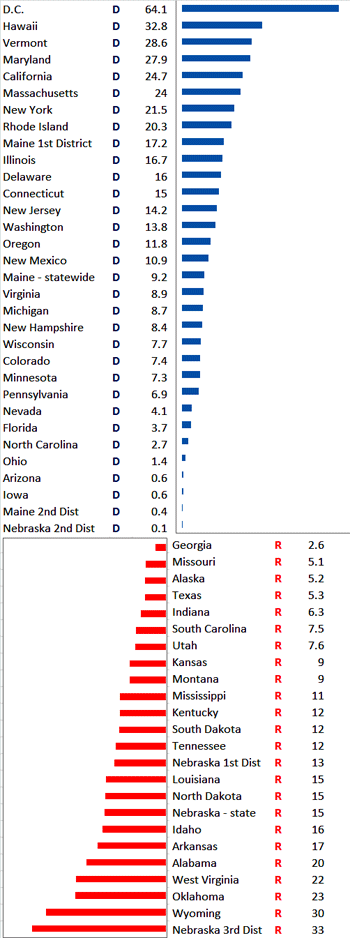
For what it's worth, this particular composite adds up to a Clinton victory, with about a 6.3% advantage in the popular vote. Probably upwards of 300 electoral votes (270 wins). Not a landslide, but pretty convincing.
Come Nov. 8, we shall see. (What our God in Heaven has in store.) Two other composite forecasts to check out: The New York Times and Real Clear Politics. For an idea of the historical track record of presidential polls vs. actual outcomes, look at Gallup
|
||||||
 The Peterson Institute, a think-tank in Washington, DC, predicts that Mr Trump's protectionist policies would spark a trade war, push America into recession and destroy 4.8m American jobs by 2019.”
The Peterson Institute, a think-tank in Washington, DC, predicts that Mr Trump's protectionist policies would spark a trade war, push America into recession and destroy 4.8m American jobs by 2019.”9/3/16 -- "Try to remember the kind of September when grass was green and grain was yellow"
|
Was there ever a better summer for staring back into our carefree, gauzy past? To simpler, gentler times. Turns out there really was something to purity of thought, word and deed. More innocent than we knew.
But don't worry. After this election we probably won't ever have to go through another one ever again. Ever. Michele Bachmann doesn't think so. Still, even when life turns coarse and cranky, certain traditional values endure. One among them our idyllic recollections of summers past. Another, of course, our Summer Song Jukebox. Just like you do with your memories, we've burnished the jukebox up a touch to keep it relevant to our times and manners (O tempora, o mores: Cicero). In some ways you might not even notice, but the experience should be magically if subtly more satisfying.
The technology has been updated to YouTube's newest coding standards. The old flash player has been replaced. And the viewing screen is slightly expanded to take advantage of today's larger viewing formats (even when rendered on smaller surfaces). Sixteen old broken song links have been updated, and until someone changes something, all the titles should be working. But YouTube is organic just as we are. It must be monitored periodically and maintained. But the songs, the songs are the old songs still, just as you remember. Timeless and not in need of improving. |

Suggested Five-Sad-Song Starter Set: The Lonely Surfer Jack Nitzsche (1963) Summer Song Chad and Jeremy (1964) The Things We Did Last Summer Jo Stafford (1946) The Girls in Their Summer Dresses Harry Belafonte (1966) Summer Of '69 Bryan Adams (1984)
Suggested Six-Happy-Song Antidote Set: Here Comes Summer Jerry Keller (1959) Palisades Park Freddy Cannon (1962) Hot Fun in the Summertime Sly & the Family Stone (1969) Under the Boardwalk The Drifters (1964) Summer War (1976) All Summer Long Kid Rock (2008) Scroll to bottom of page to play the entire YouTube song list.
So what of summer's drawing to a close? The songs of summer that you cherish remain, awaiting the chance to meet up with you again, to take you back to those warm and reassuring places in the mind. As Simon and Garfunkel said, preserve your memories. Where you were young, when life was mellow and still mostly before you, your girlfriend was hot or your boyfriend hunky — at least eminently likable. Better hair, less fat, quicker reflexes, fewer wrinkles, no stretch marks, all hope however mindless, no fears, no hurry, no worries, still time. Good music. Happy Labor Day. |
7/30/16 -- Trump v Reagan: a modest point of difference
|
Actually, there are lots, but let's start with this. I believed Donald Trump when he said he was joking about asking Russian hackers to find Hillary Clinton's 30,000 missing emails. Actually there aren't really 30,000 missing emails, but that is no matter where humor is concerned. Everything is expendable, even facts, when a good laugh line is at stake. And it was a good laugh line. It's a joke I wouldn't hesitate to tell myself if I'd thought of it first.
And if it offends some people, I don't care. If they don't know how to laugh, that's their problem. Besides, I'm not running for anything: not public office, not a job, not the school board, not a beauty contest, not even the bus. (There'll be another one along.) Laugh. Don't laugh. I've got nothing to lose. Donald, on the other hand, IS running for public office, the highest public office in the land. And that puts certain pressures on a body. As Donald learned, to his dismay—again—when you're a candidate you want to be careful not to put yourself in positions where your words can be misconstrued. You don't want to say or do anything amiss. That rubs people the wrong way. That makes them think you're an idiot. Ronald Reagan, the great communicator and a man who appreciated a good joke both given and received, once got himself into trouble before a hot mike, cracking a joke about thermonuclear war. A phrase, by the way, neither George Bush (nor Dwight Eisenhower) could even pronounce correctly.
The Gipper was preparing to make his weekly Saturday radio address on National Public Radio when, during a sound check, he offered the following joke to the radio technicians: "My fellow Americans, I'm pleased to tell you today that I've signed legislation that will outlaw Russia forever. We begin bombing in five minutes." The joke was merely a dark parody of his opening line for that day's speech (on education). Most people still think it went out live, but the gaffe wasn't really broadcast over the air. Still, it leaked out just the same.
And rather quickly. The Tokyo newspaper Yomiuri Shimbun reported months later that the Soviet Far East Army had been placed on alert, and the alert was not withdrawn until 30 minutes later. The Pentagon evidently became aware of the alert. Eventually the Soviet reaction and mild confusion it created both wound up on the NBC nightly news. The Soviet news agency, TASS, officially complained thusly: "The USSR condemns this unprecedented and hostile attack by the US President...This kind of behavior is incompatible with the great responsibility borne by heads of nuclear states for the destinies of their own people and mankind." |
Other posts on this page ...
Obama is the worst, except compared to everybody else
Black Diamonds: see how they shone
Want smaller government? Root for a recession.
The king is dead
Men for Some Seasons
NH Bulletin #1
NH Bulletin #2
It could happen to anyone
Save this. You'll need it four years from now.
Cheaters sometimes win.
Channeling Charlie Sheen.
Glen Frey
One could say the Russians tried to politicize the incident. Imagine that. How low. Reagan regularly continued his practice of cracking wise before launching a speech or address. But he never made another crack about thermonuclear war. Others certainly did, but he realized it just wasn't the proper material for a President to joke about. In other words, he reflected and he learned and he added what he learned to his file on Presidential deportment. There is scant evidence to suggest that the Donald is actually capable of learning anything from experience in that way. Except that he does seem to have learned to avoid overleveraging his debt position with the banks, which is what came within a whisker of wiping him out in Atlantic City, and with the Plaza and other hotels, and with the Eastern Airlines shuttle. That's a message he did get. (See How Trump's Debt Addiction Crushed the Biggest Company He Ever Ran, Fortune, March 31, 2016. But you haven't heard the last inappropriate crack out of the Donald's mouth. That's a message he never seems to get. He just doesn't understand why it's important. It's not like it could break him financially or anything. He doesn't see what else there might be to lose. Which is probably why he's never going to get elected president. Even the slowest-witted and hopelessly partisan will eventually catch on: when Trump is near a live mike (or even a Twitter feed) you can just never be sure of what he might say. Neither can he.
You can't have that in a president. Nothing personal, Donald. |
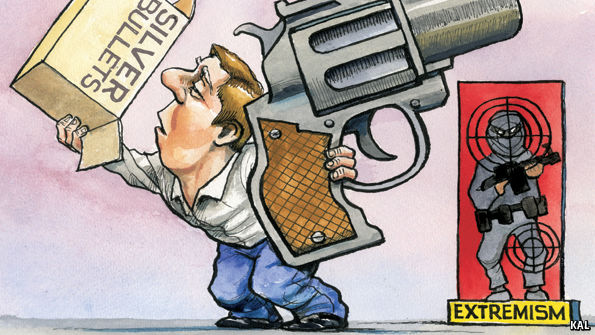 Radicalisation is a problem far too complex for simplistic Trumpian solutions”
Radicalisation is a problem far too complex for simplistic Trumpian solutions”6/15/16 -- If you can meet with triumph and disaster and treat those two impostors just the same
GALLUP |
IF
If you can keep your head when all about you |
|||||||||||||||||||||||||||||||||||||||
 |
 |
 |
 |
 |
 |
|
| Trump | Cruz | Rubio | Kasich | Clinton | Sanders | Delegates | 1,542 | 559 | 165 | 161 | 2,219 | 1,881 |
|---|---|---|---|---|---|---|
| Superdelegates | 581 | 49 | ||||
| Total | 1,542 | 559 | 165 | 161 | 2,800 | 1,881 |
| Needed | 1,237 | 2,382 |
5/9/16 -- Mr. Peabody's Coal Train done hauled it(self) away
|
In its way, it was as iconic as The City of New Orleans, summoning up a trope of the steel rails to toll the passing of an era. Now it's time for somebody to write a new train song. Mr. Peabody's coal train has rolled to a stop. Little noted news item: Peabody Energy, founded 1883, has declared bankruptcy. It billed itself as the world's largest private-sector coal company. Sic transit gloria. Long, lumbering freight trains bearing the Peabody brand on car after car once were synecdochic for the industry itself, A massive private oligarchy readily associated with ethical high-handedness, a cold indifference to human misery, an infamous disregard for the safety and welfare of its own workers, chilling contempt of the valleys and mountains it ravaged and ruined, and greed that surpassed human understanding. And revered for the muscular power it delivered, on time and every day, to fuel an industrial revolution on two continents. Now more and more of those trains sit idling in the train yards or on the sidings along the right-of-way. The massive coal hoppers rest beneath the lofty loading chutes of the breakers, themselves halted mid-pour. The powerful associative imagos already begin to dissolve before our eyes into the mist.
Peabody coal was once a formidable part of the force of nature that turned loose the dreams of a thousand industrial pioneers furiously building America from a colonial outpost to an industrial behemoth that would bestride the world. Inventing, as it went, the working multitude that pulled 20th century society out of poverty and into the middle class. Resting just one day a week and just below the class above that it, in turn, was making unimaginably rich. Along the way, it incubated a breathless range of respiratory illnesses that visited wrenching, painful deaths on millions and ushered in airborne particulate matter and climate patterns capable of rendering our planet unlivable in the very future it worked so hard to build. Coal mining goes back thousands of years. In the Americas, the Aztecs used coal for fuel and ornaments. The Romans dug coal in Great Britain in the 2nd Century. At the time of the signing of the Magna Carta in 1215, coal was already a traded commodity in Scotland and England, By the eighteenth century coal mines were common throughout Europe.
Coal was the dominant source of heat for American homes for much of the late 19th and early 20th centuries. Americans were still burning more than 50 million tons for heating as late as 1950. But today in the U.S. coal is used mainly in power plants and steelmaking. Onerous and often dangerous work and the harsh treatment miners were subjected to by colliery owners gave rise to the labor and trade unions which in time grew into powerful political forces in many countries in the 20th century, Miners became driving forces in socialist movements in Britain, Germany, Poland, Japan, Canada and the U.S. Management/labor disputes were often contentious, at times marked by violence and thuggery. Much of the traditional political "Left" in British politics can be traced back to coal-mining areas. And much of the worker movement celebrated by America's early folk music scene of the '20s, '30s and '40s revolved around coal mining lore, legend and daily tragedy. Coal warmed our homes, lighted our lives, fired our factories and damn near killed us off in a dozen different ways. The Peabody, Daniels & Company was founded in 1883 by the son of a prominent Chicago lawyer. In 1890, Francis Peabody bought out his partner's share of the business, and the company was incorporated in Illinois under the name Peabody Coal Company. In 1895, Peabody began operations at its first mine in Williamson County, Illinois. In 1913, the company won its first long-term contract to supply Chicago Edison Company, which today provides electricity to basically all of northern Illinois from Indiana to the Mississippi as Commonwealth Edison. Peabody Coal went public in 1929 with a listing on the Midwest Stock Exchange. In 1949, the company was listed on the New York Stock Exchange. It was ranked eighth among the country's top coal producers in the mid-1950s. But gradually Peabody began to lose market share to companies operating more cost-efficient surface mining operations. Eventually it merged with Sinclair Coal Company, resulting in the transfer of Peabody's headquarters to St. Louis, Missouri. 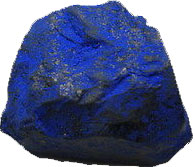
Anthracite mined by the Glen Alden Coal Company in Pennsylvania was sprayed with a trademarked blue dye before shipping to its northeastern U.S. markets to distinguish it from its competitors.
|
Peabody reported a loss of $2 billion in 2015. It warned of further declines this year owing to reduced coal use by U.S. utilities and lower demand in overseas markets. Shares of Peabody (BTU) plunged more than 75% this year, recently trading near $2. The company today has roughly 7,600 employees. The US has historically mined four major types of coal: anthracite, bituminous, subbituminous and lignite. Subbituminous and bituminous dominate production. Today's output is generally used to generate electricity. Subbituminous coal makes up 47% of U.S. production by weight. Bituminous coal makes up 45%. Anthracite, with the highest carbon content (86% to 97%), was used in home heating. It comprises only 0.2% of total production today. Anthracite mining, with deposits essentially confined to northeast Pennsylvania, went into decline in the 1950s. The Knox Mine Disaster in 1959 served as the death knell for deep anthracite mining in Pennsylvania (28 miners died). What little being mined today is taken via strip mining. Lignite, also used for generating electricity, makes 7% of U.S. coal production by weight. Texas and North Dakota are the main producers. Total U.S. coal output soared until 1918; before 1890, it doubled every ten years, going from 8.4 million short tons in 1850 to 40 million in 1870, 270 million in 1900, and peaked at 680 million short tons in 1918.
(A short ton is a U.S. measure (2000 lbs.). The British ton is called a long ton (2340 lbs.). Both tons are actually defined in the same way: as 20 hundredweight. But a U.S. hundredweight equals 100 lbs.; a British hundredweight equals 112 lbs. There's also a metric ton, but who cares.) The United Mine Workers (UMW) became the dominant force in the coal fields in the 1930s and 1940s, winning high wages and benefits. In 1914 there were 180,000 anthracite miners; by 1970 only 6,000 remained. At the same time steam engines were phased out in railways and factories, and bituminous came to be used primarily for generating electricity. Employment in bituminous mining peaked at 705,000 men in 1923, falling to 140,000 by 1970 and 70,000 in 2003. UMW membership among active miners fell from 160,000 in 1980 to 16,000 in 2005, as coal mining became more mechanized and non-union miners predominated in the new coal fields. Coal mining in the United States is still a major industry, taking place in 25 states, 40% on public lands. Today, Wyoming is the largest producer of coal in the U.S.
Coal mining has been, almost from its beginnings, the existential bete noire of the hard-working men who too often traded their own lives for its, mixing up fear, admiration and dependence. Even now, as the industry nears sunset, its majestic hauteur and financial might almost totally forgotten by most, inspired memories live on in the hearts and minds of the mines' survivors and the families of generations who nourished the industry and whose lives it sustained. 
Todd Domboski stares at the abyss that briefly swallowed him — a hole swirling with toxic gases from an underground mine fire. On February 14, 1981, 12-year-old Domboski sank into a cave-in that ruptured the soil in his grandmother's backyard in Centralia, PA, where an abandoned coal mine had smoldered for 19 years. The Centralia blaze, still burning today, ranks as the worst mine fire in the United States. More than 200 underground and surface coal fires are burning in 14 states, according to the U.S. Department of Interior. Photograph from AP Their past and their heritage hang over them now like a shroud, haunting their familial memories and values, and still they will deeply mourn its passing. It really wasn't much of a way of life, but it was the way of life they and their fathers and their fathers' fathers knew and accepted and embraced. They clung to it without even knowing why. Such is our fragile and self-defeating nature as a species. |
 To my mind, it's an attempt by people who cannot stand the progress our country has made in recognizing the human rights of all of our citizens to overturn that progress.... I feel that this is a time for me and the band to show solidarity for those freedom fighters. As a result, and with deepest apologies to our dedicated fans in Greensboro, we have canceled our show scheduled for Sunday, April 10th.... [This] is the strongest means I have for raising my voice in opposition to those who continue to push us backwards instead of forwards.”
To my mind, it's an attempt by people who cannot stand the progress our country has made in recognizing the human rights of all of our citizens to overturn that progress.... I feel that this is a time for me and the band to show solidarity for those freedom fighters. As a result, and with deepest apologies to our dedicated fans in Greensboro, we have canceled our show scheduled for Sunday, April 10th.... [This] is the strongest means I have for raising my voice in opposition to those who continue to push us backwards instead of forwards.”3/31/16 -- See if you can figure out what's going on here ...
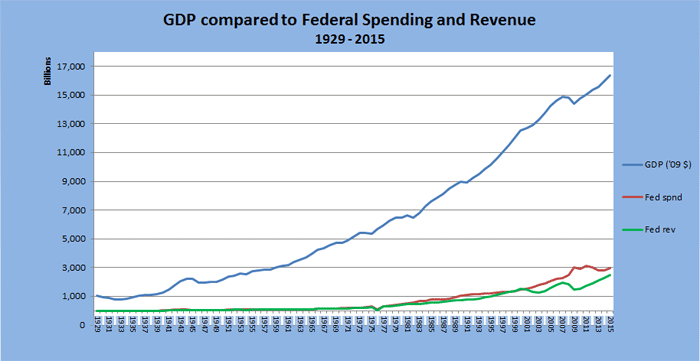
3/5/16—Cruz Takes CPAC Straw Poll
|
2016 Conservative Political Action Conference (National Harbor, MD, Mar. 2-5)
Presidential Straw Poll
* Name not on ballot but written in by a significant number of voters.
Voting by 2,600 CPAC attendees. Gov. Nikki Haley (SC) was the top pick for vice president. Gov. Kasich and Carly Fiorina were close behind. Ron Paul was the fourth VP pick. Donald Trump cancelled a Saturday morning speech at CPAC to campaign in Kansas and Florida. About half of straw poll voters were between ages 18 and 25. Nearly 85% of CPAC attendees identified as pro-life, and nearly 62% said they were "strongly" pro-life. More than 85% said religion was important in their daily life. (Reporting by The Washington Times)
Past winners: 2015 - Rand Paul (26%)
2014 - Rand Paul (31%)
2013 - Rand Paul (25%) edging out Rubio (23%)
2012 - Mitt Romney (38%)
2011 - Ron Paul (30%)
2010 - Ron Paul (31%)
|
2/23/16 -- And miles to go before I sleep. And miles to go before I sleep
|
So, are we getting weary of politicking and primaries at this point? Well, better buck up. There are 75 primaries and caucus scheduled for this year, and we've only been through the first handful. You won't be returning to your regular programming schedule until around mid-June. It's enough to make one long for a fellow passenger to sidle up during the morning commute with a pile of baby photos they want to share.
|
Below is a handy calendar of this election year's primary events to make sure your mind doesn't wander. Print it, cut it out, fold it and keep in in your pocket. Close to your heart. And here's a handy link for all kinds of salient details and results of those events blessedly behind us. In case you need to check back. Plus running delegate counts, candidate bios, convention schedules, etc.
There's always the chance you'll get perversely hungry for more. Courtesy of 2016 Election Central. The site is maintained, apparently, by a non-partisan enthusiast. (Who would waste precious time devoting himself to such drivel, you ask?) |
||||||||||||||||||||||||||||||||||||||||||||||||||||||||||||||||||||||||||||||||||||||||||||||||||||||||||||||||||||||||||||||||||||||||||||||||||||||||||||||||||||||||||||||||||||||||||||||||||||||||||||||||||||||||||||||||||||||||||||||||||||||||||||||||||||||||||||||||||||||||||||||||||||||||||||||||||||||||||||||||||||||||||||||||||||||||||||||||||||||||||||||||||||||||||||
2016 Primary Schedule |
|||||||||||||||||||||||||||||||||||||||||||||||||||||||||||||||||||||||||||||||||||||||||||||||||||||||||||||||||||||||||||||||||||||||||||||||||||||||||||||||||||||||||||||||||||||||||||||||||||||||||||||||||||||||||||||||||||||||||||||||||||||||||||||||||||||||||||||||||||||||||||||||||||||||||||||||||||||||||||||||||||||||||||||||||||||||||||||||||||||||||||||||||||||||||||||
|
|
||||||||||||||||||||||||||||||||||||||||||||||||||||||||||||||||||||||||||||||||||||||||||||||||||||||||||||||||||||||||||||||||||||||||||||||||||||||||||||||||||||||||||||||||||||||||||||||||||||||||||||||||||||||||||||||||||||||||||||||||||||||||||||||||||||||||||||||||||||||||||||||||||||||||||||||||||||||||||||||||||||||||||||||||||||||||||||||||||||||||||||||||||||||||||||
2/16/16 -- Just an Old Fashioned Love Song ...

Alas poor Scalia, a divisive figure even in death. Condolences hadn't even stopped flowing when both parties started fighting over replacing him. Confirming a Supreme Court Justice could take months in this hostile political climate, but there's ample time for the process to play out within Obama's second term. Which is just what Democrats insist should happen. Republicans don't want this President making decisions about floral arrangements in the executive dining room in his last year of office, much less a lifetime appointment that would turn the Court's majority from rightward to leftward. Democrats note that this is precisely the power (i.e., the Court not the flowers) the Constitution invests in the executive branch. Who's right? How could that matter? Congress let Andrew Jackson make a Supreme Court appointment on his last day in office. Then, rather than let Andrew Johnson make any Supreme Court appointment at all, Congress simply eliminated two vacant positions. And then restored them after the man was gone. Folks need to admit to themselves — and you do too — that Congress can, and will, do what it pleases. And thus gain the approval or, as has happened from time to time, suffer the consequences of public opinion. Sometimes they guess wrong. The Supreme Court was established by the Constitution, but just about everything about it was left to Congress or its own whims. There are no official qualifications for being a Supreme Court Justice. The Court's key role, that of evaluating the constitutionality of legislation ("judicial review"), it simply arrogated to itself via the fourth Chief Justice, John Marshall's ruling, arbitrary and unilateral, in Marbury v. Madison. Everybody else has just sort of gone along with it ever since. Nobody ever did know how to handle John Marshall. The Judiciary Act of 1789 set the number of justices at six: a Chief Justice and five Associate Justices. In 1807, Congress increased the number to seven; in 1837, it was bumped up to nine; and in 1863, it rose to 10. In 1866, in the aforementioned high hard one at President Johnson's head, the Judicial Circuits Act reduced the number to seven. Three years later, the number was raised back to nine, and there it has stood ever since. In 1937, in an effort to create a court more receptive to his New Deal programs, President Franklin Delano Roosevelt tried to persuade Congress to add a new justice for every current one over 70 who opted not to retire (putatively raising the number to a maximum of 15. Congress didn't go for it. The Constitution spells out no age, citizenship or residency requirements for joining the High Court. Six justices have been foreign born; the most recent, Felix Frankfurter, native of Vienna. The youngest associate justice ever appointed was Joseph Story, 32 years old. Associate Justice Oliver Wendell Holmes Jr., who served from 1902 to 1932 and retired at age 90, was the oldest to sit on the Court. Every justice has been a lawyer prior to joining the Court, but there's no requirement. During the 18th and 19th centuries, many lawyers got their training by studying under a mentor. Justice James Byrnes (1941-42) was the last without a law school degree. (Byrnes didn't graduate from high school either.) Harvard has produced more members of the court than any other law school (with 20 justices who graduated or at least attended).
John Marshall, fourth Chief Justice of the United States and the true founder of the feast
Presidents William Henry Harrison, Zachary Taylor, Andrew Johnson, and Jimmy Carter were the only ones who didn't get to nominate a Supreme Court justice during their time in office. Of those, only Jimmy Carter served a full term in office without getting to make a nomination. FDR placed eight on the High Court, plus he elevated one to Chief Justice. (FDR served three full terms as President and died early in his fourth. His successor, Harry Truman named three more justices — two during what would have been Roosevelt's fourth term.) Eisenhower named five. Jackson got six, and the all-time champ, Washington, named 11, but he had a unique advantage. The current Republican bubble is owing primarily to Carter's bad luck and the twelve-year run of Republican presidents achieved by Reagan and GHW Bush. The advantage borne of successive presidencies is obvious. A super-majority of 60 votes in the Senate is required to confirm or to reject a nominee. Once confirmed, a justice can be removed by retirement, resignation and Congressional impeachment and conviction. Only one justice has been impeached by the House (Samuel Chase, in 1805), and he was acquitted in the Senate. Naming Supreme Court justices used to be a pretty pro-forma affair. The president used to throw out a name and Congress would go, yeah, yeah, yeah, or oyez oyez or whatever was fashionable at the time. That changed in the early 20th century. From Truman through Nixon justices were typically approved within one month. No more. Now it's a multi-month affair. Some have opined that the Senate has evinced greater interest in confirmation hearings ever since discerning that nominees were starting to sport more pronounced political baggage. But this is Congress we're talking about. More likely their interest reflected their own atmosphere of increased polarization as much as anything else. Republicans and Democrats have spent decades figuring out how not to get along with one another, and it's only reasonable they would get better at this with the passage of time. The confirmation process now also gets considerable attention from special-interest groups that lobby senators to confirm or to reject a nominee, based on how his or her track record aligns with a group's goals. Think NRA. Think of all the money lobbyists give to Congressmen. Interestingly, Chief Justice John Roberts, who was a pretty straightforward affair as these things go, was grilled almost as long as Clarence Thomas, who was anything but. In 1916, President Woodrow Wilson nominated William Brandeis to the Court. Brandeis was, in the words of Justice William O. Douglas, "a militant crusader for social justice." The opponents he'd long battled in courtrooms were invariably entrenched and moneyed interests. He took cases without accepting a fee, which him a reputation for incorruptibility. He was also the first Jew ever to be named to the Court. Brandeis had written a series of articles for Harper's Weekly that suggested ways of curbing the power of large banks and money trusts. He also urged the Wilson administration to develop ways the Department of Justice might enforce antitrust laws more effectively. |
He battled, successfully, The New Haven Railroad and J.P. Morgan. Brandeis was one of the architects of the Federal Trade Commission and an early proponent of the Federal Reserve Bank and served as Wilson's chief economic adviser from 1912 until 1916. Much of his opposition no doubt stemmed from this anti-establishment track record. Its ranks included conservative Republicans, bankers, big business and even the legal profession itself. Former Attorney General George Wickersham branded Brandeis "unfit to serve." The Wall Street Journal called him "rabid." The New York Times worried that having been a "reformer" for so many years, he would lack "the dispassionate temperament that is required of a judge." The confirmation process dragged on for four months. According to legal historian Lucas Powe, resistance to Brandeis's appointment also stemmed from "blatant anti-Semitism." Former President (and future Chief Justice) William Howard Taft, known in his time as a fairly sober, deliberative sort, accused Brandeis of using his Judaism to curry political favor. Wickersham would refer to Brandeis's supporters as "a bunch of Hebrew uplifters." The controversy went on so long and loud that the Senate Judiciary Committee, for the first time in its history, held a public hearing on the nomination, with witnesses offering testimony both for and against. Brandeis himself did not attend. But Brandeis was also a brilliant legal mind who had had a transformative impact on the legal profession. (He had graduated Harvard Law at age 20 with the highest grade average in the school's history.) The Boston law firm he founded is still in practice today (as Nutter, McClennen & Fish). He had his share of energized supporters. On June 1, 1916 the Senate confirmed Brandeis, 47-22. Forty-four Democrats and three Republicans voted in favor; Twenty-one Republicans and one Democrat voted against. (For all that, a Democrat-controlled chamber. What was the problem?) Supreme Court Nominees:
Hours Spent Being Questioned (and vote)
The first appointee to actually attend his own hearings was Felix Frankfurter in 1938. Like Brandeis, he was a social justice lightning rod and a Jew. Not to mention a vocal supporter in the '20s for granting the convicted anarchists Saco and Vanzetti a new trial. In the Senate hearing room Frankfurter was the first to invoke the "My public record speaks for itself and I have nothing to add to it" defense, which has been echoed by almost every subsequent Supreme Court nominee seeking to navigate his or her way around uncomfortable questions. Hearings began to turn more contentious in the '50s when southern Democrats turned hostile to the Court as a result of desegregation decisions and conservative Republicans were working themselves into a lather over national security issues and the red menace in Hollywood. The contumely continues to grow. Since Lincoln and the birth of the modern Republican Party, the GOP has held the White House for 92 out of 155 years — 59% of the time. And have appointed 52 (or 66%) of the 79 justices named in that period. A little better than an even split. From Lincoln to now
But because the Justices have indefinite tenures and quit or die on no set schedule, vacancies occur unpredictably. Some come in quick succession, and sometimes there's a fair passage of time between opportunities. In what's increasingly thought of as the modern era, since Harry Truman's Presidency to the present (71 years), Democrats have occupied the White House for 35 years (or 49% of the time) and named 12 justices (41% of the 29 that have been named), and Republicans have held the office for 36 years (51%) and named 17 justices (59%). Still, a slightly disproportionate advantage for the GOP. From Truman to now
But if you go back to the FDR presidency, the Democrats hold a slight advantage from then til now, even though FDR's Republican predecessor (Herbert Hoover) named 4 justices in his one term. The Democrat advantage is then 47 out of 87 years (54%) and 20 out of 37 justices named (also 54%). From FDR to now
If Obama should succeed in advancing a candidate to the Court before leaving office, or the Democrats were to hold onto the White House in the 2016 election, the tilt would most likely improve the Democrats' position even more so. Which is at the crux, of course, of Republican resistance to moving this thing too fast. And since they hold a majority in the Senate, there isn't much to stop them from slow-walking any nomination no matter how conciliatory the candidate might seem. Except perhaps for the rancor of voters at the spectacle of a Congress, already perceived as pretty feckless, sitting down on the job the American public pays them to do. It's a balancing act. Rest assured Republican and Democratic leaders, whatever their bravado or rhetoric, will have a sharp weather eye on the polls monitoring the national temperature and heart rate as November approaches. A miscalculation could have repercussions in the Senate as well as in the race for President. No one needs that. Then there's the Clint Eastwood conundrum. As Dirty Harry he used to like to tortuously query a subdued malefactor who'd lost track of the detective's bullet count. With the prospect that Democrats could prevail in the Presidential race in November and even worse, perhaps in response to the spectacle of legislative knuckle-dragging, voters could decide to flip the Senate. Republicans may want to weigh the possible benefits of making a deal with Obama now and get a more acceptable compromise candidate versus a far more liberal, "hair-on-fire" alternative proffered by a new Democratic regime in control of both ends of Pennsylvania Ave. Dirty Harry used to tell his perp that he'd lost track of the bullets too. Could have been five. Could have been six. "You have to ask yourself," he'd say: "'Do I feel lucky?'" Well, do ya, Mitch? In any event, where Congress is concerned, there's nothing new under the Sun. They're going to do what they're going to do. May turn out to be wrong, but that won't stop them. Just the same though, you may as well pull up a chair. This could still turn out to be fun. |
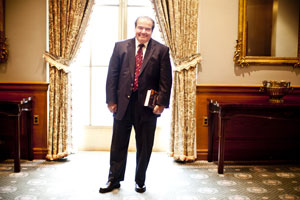
et lux perpetua luceat ei.
Requiescat in pace.
2/9/16 -- Trump Cruises in New Hampshire; Kasich a Suprise (not to him) Second
|
New Hampshire 2016 Republican Presidential Caucus, Feb.9
|
2/9/16 -- Sanders Soars in Democratic Primary
|
New Hampshire 2016 Democratic Presidential Caucus, Feb.9
|
The Art of Casual Deceit - Installment II (in a series)
Maybe this is a tale of skullduggery born in the corn field, or maybe it's just about a simple, regrettable mistake as Ted Cruz claims.
On the night of the Iowa caucuses Cruz's campaign forwarded a CNN news report to his followers about a campaign rival deemed of interest to them. The Cruz people read the report to suggest Ben Carson might be suspending his campaign.
"My political team saw CNN's report, breaking news, and they forwarded that news to our volunteers," Cruz said during the Republican debate the following weekend.
This was Cruz's version of events. "On Monday night at about 6:30 p.m., CNN reported that Ben was not going from Iowa to New Hampshire or South Carolina. Rather he was 'taking a break from campaigning'.... CNN's political anchors Jake Tapper and Wolf Blitzer said it was highly unusual and highly significant.
"My political team ... forwarded that news to our volunteers.... CNN didn't correct that story until 9:15 that night. So from 6:30 p.m. to 9:15, that's what CNN was reporting."
[inaudible] ...from the Ted Cruz campaign, calling to get to a precinct captain, and it has just been announced that Ben Carson is taking a leave of absence from the campaign trail, so it is very important that you tell any Ben Carson voters that for tonight, uh, that they not waste a vote on Ben Carson, and vote for Ted Cruz. He is taking a leave of absence from his campaign. All right? Thank you. Bye.
Cruz's campaign people concluded that his actions constituted a break in his campaign, even though the CNN report hadn't made that explicit point. And they were moved by that conclusion to encourage caucus goers to not "waste" a vote on Carson, but give it to Cruz.
CNN countered that they never issued a correction to their story at all: their story had never said Ben Carson was suspending his campaign. It merely noted that his travel plans were unusual.
Perhaps it was just a regrettable mistake, but in his retelling, Cruz went to lengths to blame CNN for the mix up without noting that his campaign first jumped to conclusions and then tried to exploit the situation to their advantage.
Cruz may have not personally created the false story line nor arranged its distribution. But even if it was all his campaign people's doing, getting it wrong the next day, in such a lawyerly, elliptical and self-absolving manner was all his doing.
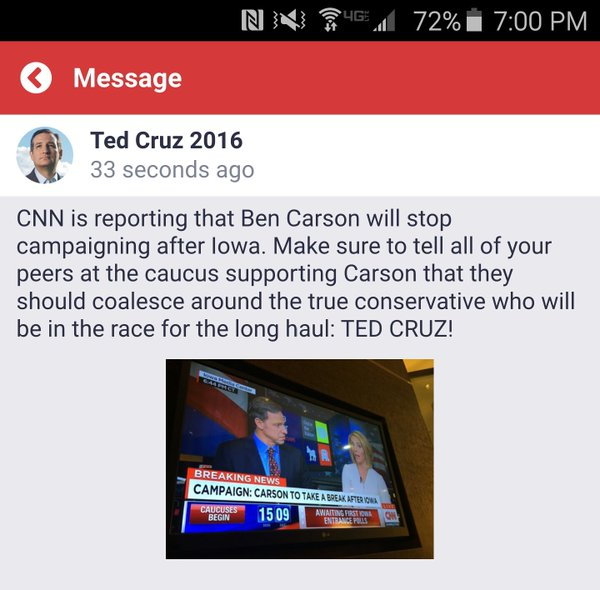
Politifact rates Cruz's account "False," one step above their lowest rung: "Pants on Fire." They commented, "The Cruz campaign sent messages ... saying that Carson would 'stop' his campaign. A key surrogate said that Carson was doing 'the equivalent of suspending.' That's more than simply 'forwarding' news."
Politifact scores 70% of Cruz's public statements "Mostly False" or worse. It's hard to understand how he squares his truth deficit with the avowedly Christian mantle he so proudly adorns himself with.
How much damage did the stunt do? The Washington Post thought not so much. They concluded Cruz could not have syphoned enough votes from Carson to make a difference in the final results. Carson is not so sure. He has said he was getting intelligence from a lot of different places "saying I was going to do extraordinarily well."
Resolute journalism could get to the bottom of it. Carson supporters could fairly easily be identified. How many got the message? How many switched their votes? If not a completely thorough accounting, a pretty good picture would emerge.
It's not likely to get done, however. The moving finger of journalism has written and moved on. It does not dwell in the past. It's already hitched a ride to New Hampshire.
2/3/16 -- Now That They're Over, Everything You Need to Know About the Iowa Caucuses
|
Iowa isn't like other states. Its presidential candidate choices, for both parties, are arrived at through a caucus system. What's a caucus? Nothing more than a meeting — hopefully of generally like-minded people. Of Democrats, say, or Republicans. Iowans describe their caucuses as gatherings of neighbors. The meetings take place pretty much anywhere: in schools, churches, libraries, gyms, meeting halls or people's homes if they're big enough and the local population is small enough. The caucuses are actually only the first stage of Iowa's candidate selection process. But this stage is the one that the country, meaning the media with the help of the apparati of both major parties, has grabbed onto as the signal, high profile early "moment" of the long slog toward selecting the standard bearers for our nation's highest office. Hey, in Washington's day they did it with wagons loaded with casks of whiskey, cider and ale, freely distributed. And the candidate didn't even show up for the rallies.
The approximately 1900 caucuses take place within political precincts, of which Iowa has 1,681. What actually gets elected is delegates — to the next stage of political festivities, namely county conventions. Iowa has 99 counties. County conventions then select delegates for both the state Congressional District Convention and the State Convention, which, every four years, chooses the delegates for the two national party conventions. Iowa first held its Democratic caucus in 1972, They held their first Republican caucus four years later. The Iowa caucuses have a 43% success rate in predicting the ultimate Democratic candidate and a 50% success rate in predicting the Republican candidate. What the caucuses may more reliably indicate is which candidates are likely to drop out. Huckabee and O'Malley announced as soon as the caucuses were complete. Paul and Santorum dropped out two days later. Ben, Carly, Jeb, Jim: what's your pleasure? Chris, John: we know you two are not throwing in the towel just yet, but you will, you probably will.
In addition to the voting and the presidential preference choices, caucus-goers begin the process of writing their parties' platforms by introducing resolutions. But really, who cares about that? |
For Republicans, the caucus is a pretty simple affair. Candidates' representatives make an impassioned pitch, and attendees vote using secret ballots, which are then tallied to see who'll attend the party's county, state and national conventions. Democratic caucuses are more complicated. After an hour of hearing candidates' volunteers make their case, the caucuses hold an unofficial ballot called a "straw vote. This gets done by a show of hands or by dividing themselves into groups according to candidate. Candidates who don't get at least 15% of the vote are considered out of the running. Those caucusing for the remaining candidates then seek to persuade each other to support for their candidate and get the most votes. In Iowa, you can register for a causus right up till caucus day, and many do wait til then. In rural precincts where the population is so small they only elect a single delegate, the selection is done by majority vote on a paper ballot. Ties and rounding errors are sometimes decided with a coin flip. In 2012 Iowa switched from a winner-take-all to proportional allocation. The intent was to give lesser-known candidates a better chance and make it harder for a frontrunner to secure a pre-emptive majority too early.
So after all that strum und drang, the thrill and the agony, the laughter and the tears, Hillary and Bernie split 50.1/49.9. She gets 22 Iowa delegates at the national convention, he gets 21. Cruz got 8 delegates. Trump and Rubio each got 7. Th-th-th, that's all folks. Well, maybe not all. In 2012 the initial report out of Iowa was that Mitt Romney had beat out Rick Santorum by 8 caucus votes; two weeks later that report was "inoperative." Santorum had actually beaten Romney by 34 caucus votes. So maybe there could still be some fluidity in the current situation. One final footnote: Per the 2016 Iowa Caucus Presidential Election website, the results of caucus activities, on both the Democratic and Republican sides, are not binding on the elected delegates, but it says folks usually feel obligated to follow the wishes expressed by caucus-goers. No matter. As all the news people are always saying, it's way too soon. Lotta fun though, no? Especially if you're a news person. |
2/1/16 -- Cruz Draws First Blood in Iowa
|
Iowa 2016 Republican Presidential Caucus, Feb.1
|
2/1/16 -- Clinton Carries Iowa, Sort of
|
Iowa 2016 Democratic Presidential Caucus, Feb.1
|

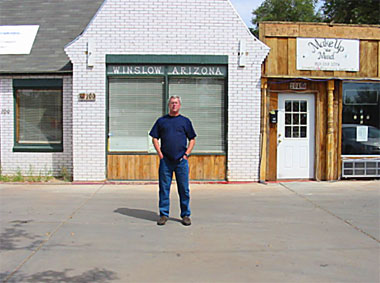 Well, my time went so quickly, I went lickety-splitly .... Glen Frey, founding member of The Eagles and one of the group's lead singers and spiritual leaders, died January 18 at New York's Columbia Presbyterian Hospital, from complications following a long illness. He was 67. Tequila has seen its last sunrise. Glen has gone to rejoin the girl from yesterday. We'll still have the CDs, the digital files we cadged with Napster, a whole bunch of YouTube videos and now, all over again, some vinyl records. (It turns out Wordsworth was prescient. Once you've been here, you're here to stay.) But that's not likely to be enough for some people. Where Glen Frey is concerned it won't be the same just living with your memories. What's the opposite of a peaceful, easy feeling? Because we didn't just lose Glen Frey. We've lost The Eagles. Remember how you felt when they broke up? Well, this is worse.
Well, my time went so quickly, I went lickety-splitly .... Glen Frey, founding member of The Eagles and one of the group's lead singers and spiritual leaders, died January 18 at New York's Columbia Presbyterian Hospital, from complications following a long illness. He was 67. Tequila has seen its last sunrise. Glen has gone to rejoin the girl from yesterday. We'll still have the CDs, the digital files we cadged with Napster, a whole bunch of YouTube videos and now, all over again, some vinyl records. (It turns out Wordsworth was prescient. Once you've been here, you're here to stay.) But that's not likely to be enough for some people. Where Glen Frey is concerned it won't be the same just living with your memories. What's the opposite of a peaceful, easy feeling? Because we didn't just lose Glen Frey. We've lost The Eagles. Remember how you felt when they broke up? Well, this is worse.

